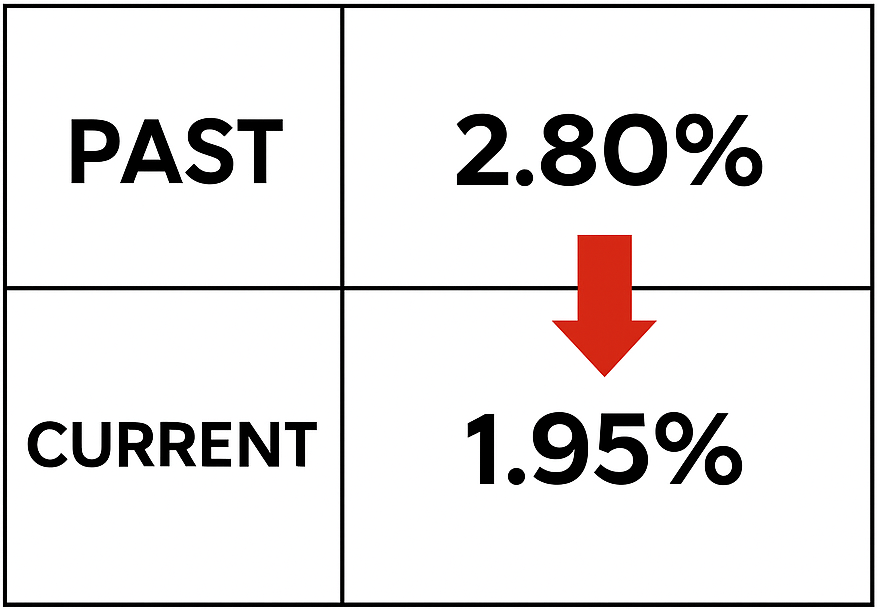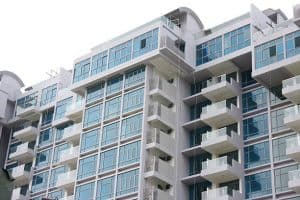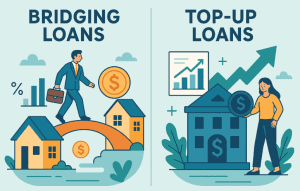Will interest rates be cut in 2025? It’s a hot topic for Singapore homeowners as global economic uncertainties loom. With major central banks hinting at rate cuts, Singapore’s 3-Month SORA rate may drop from 3.3% to around 2.5% by year-end — a potential win for borrowers looking to ease their mortgage burden.
Lower rates could mean better deals for home loan rates in Singapore, refinancing opportunities, and improved affordability for first-time buyers. But what does this really mean for your home loan plans?
Expert Tip: Start by checking out the latest mortgage loan rate Singapore and our home loan rates in Singapore guide to understand where you stand.
Let’s dive into what Singapore homeowners need to know in 2025.
What Are the Current Projections for Interest Rate Cuts in 2025?
As of mid-2025, central banks worldwide are signaling potential interest rate cuts in response to easing inflation and slowing economic growth. For Singapore homeowners, these global monetary policy shifts could influence local mortgage rates, making it essential to stay informed.
How Many Rate Cuts Are Expected Globally This Year?
Here’s a snapshot of anticipated rate cuts by major central banks in 2025:
Expected Interest Rate Cuts by Major Central Banks in 2025
| Central Bank | Expected Rate Cuts in 2025 | Current Benchmark Rate (%) | Notes |
|---|---|---|---|
| U.S. Federal Reserve (Fed) | 2–3 cuts | 4.25–4.50 | Fed officials, including Governor Waller, suggest multiple cuts if inflation trends toward 2%. |
| European Central Bank (ECB) | 1–2 cuts | 4.00 | ECB indicates cautious easing amid persistent core inflation. |
| Bank of England (BoE) | 1–2 cuts | 4.25 | BoE policymakers support gradual cuts in response to economic data. |
| Reserve Bank of India (RBI) | Up to 3 cuts | 6.25 | RBI expected to cut rates amid low inflation and global uncertainties. |
| Bank of Korea (BoK) | 1–2 cuts | 2.50 | BoK has already implemented cuts to stimulate the sluggish economy. |
What Factors Are Influencing These Decisions?
Several key factors are driving central banks to consider rate cuts:
- Easing Inflation: Inflation rates are gradually declining, approaching central banks’ target levels.
- Slowing Economic Growth: Economic indicators point to decelerating growth, prompting a need for monetary stimulus.
- Labor Market Dynamics: Signs of a loosening labor market, such as rising unemployment rates, are influencing policy decisions.
Global Trade Tensions: Ongoing trade disputes and tariffs are creating economic uncertainties, encouraging a more accommodative monetary stance.
How Do These Projections Compare to Previous Years?
Comparing 2025 projections to recent years:
- 2023–2024: Central banks raised interest rates aggressively to combat high inflation.
- 2025: A shift toward easing monetary policy is evident, with multiple rate cuts anticipated as inflation pressures subside.
This transition marks a significant change from the tightening cycles of the past two years, reflecting evolving economic conditions.
How Do Global Economic Factors Influence Local Interest Rates?
Singapore’s mortgage rates are heavily influenced by global economic forces, especially given our open economy and trade-reliant financial system.
Understanding how factors like U.S. monetary policy, trade dynamics, and inflation trends affect home loan rates in Singapore can help you make better mortgage decisions.
What Is the Impact of U.S. Monetary Policy?
The U.S. Federal Reserve’s interest rate decisions often ripple through to Singapore’s rates. Here’s how:
- Fed Rate Cuts: Often lead to lower SORA rates Singapore, making mortgages cheaper.
- Fed Rate Hikes: Typically drive local rates higher as banks adjust funding costs.
Market Sentiment: Even Fed statements can influence Singapore’s mortgage rates via investor sentiment.
How Fed Moves Influence Singapore Mortgage Rates
| Fed Action | Impact on Singapore Mortgage Rates |
|---|---|
| Rate Cut | SORA may decline, leading to lower mortgage rates. |
| Rate Hike | SORA may increase, pushing up mortgage costs. |
| Policy Guidance | Influences market expectations and local bank funding. |
Expert Tip: Stay updated on the mortgage loan rate Singapore page to track how global policy moves might impact your loan.
How Do Trade Dynamics Affect Rates?
Singapore’s economy is deeply tied to global trade, meaning trade tensions and tariffs can influence interest rates:
- Export Volatility: Slowing global trade can weaken Singapore’s economy, prompting the MAS to adjust monetary policy.
- Currency Movements: Trade tensions affect the Singapore dollar’s exchange rate, which in turn can influence borrowing costs.
- Investor Confidence: Trade disruptions can affect global capital flows, impacting Singapore’s liquidity environment.
My Take: Keep an eye on trade headlines, as they often signal shifts in Singapore home loan rates — both directly and indirectly.
What Role Does Inflation Play?
Inflation is a key driver of interest rates worldwide. Here’s why:
- High Inflation: Central banks raise rates to curb spending and cool prices.
- Low Inflation: Opens the door to rate cuts to stimulate borrowing and spending.
Singapore’s Current Trend: Inflation is moderating, leading to expectations of lower rates in 2025.
Inflation Trends and Their Impact on Mortgage Rates
| Inflation Trend | Typical Impact on Rates |
|---|---|
| Rising Inflation | Higher rates to cool the economy. |
| Falling Inflation | Lower rates to boost economic activity. |
| Stable Inflation | Rates may stay steady; mortgage rates more predictable. |
Expert Tip: Check home loan rates in Singapore frequently to spot potential opportunities in a changing rate environment.
How Will These Rate Cuts Impact Singapore’s Mortgage Landscape?
With global central banks signaling rate cuts, Singapore homeowners are naturally wondering how this might shape home loan rates in Singapore and what it means for their mortgages. As the 3-Month SORA rate is expected to ease by year-end, let’s unpack the potential impact on your mortgage plans.
What Is the Expected Trend for SORA Rates?
Singapore’s benchmark 3-Month SORA (Singapore Overnight Rate Average) is closely linked to US interest rate policy. According to financial experts, the SORA rate is projected to:
- Drop from around 3.3% in late 2024 to an estimated 2.5% by end-2025.
- Align with global rate cuts as central banks aim to stimulate growth.
Provide relief for mortgage holders and new buyers looking for lower borrowing costs.
Projected SORA Rates and Trends (2024–2025)
| Year | Estimated 3-Month SORA Rate (%) | Trend |
|---|---|---|
| 2024 | 3.3 | High |
| 2025 | 2.5 | Lower |
Keep an eye on current SORA rates and market forecasts before making any home loan decisions.
Are Fixed or Floating Rates More Advantageous Now?
With SORA rates expected to decline, homeowners face the age-old question: Fixed or floating? Here’s a quick breakdown:
- Floating Rates (SORA-linked):
- May offer lower monthly repayments as rates decline.
- However, they can rise again if inflation pressures return.
- May offer lower monthly repayments as rates decline.
- Fixed Rates:
- Provide stability and predictability.
- Typically slightly higher than floating but protect against sudden hikes.
- Provide stability and predictability.
My take? If you’re risk-averse or planning to stay put for years, consider locking in a competitive fixed rate mortgage Singapore package now while rates are still attractive. Otherwise, a floating rate might yield savings if cuts materialize.
Check Out: Explore the latest home loan rates in Singapore and fixed rate mortgage options.
How Quickly Will Banks Reflect These Rate Changes?

Singapore banks typically react to SORA movements — but not always immediately. Here’s what to expect:
- Lag Period: Banks often adjust home loan rates a few months after significant SORA changes.
- Promotional Packages: Some banks may offer teaser rates to attract new customers.
Market Competition: Intense competition among banks may drive faster adjustments.
Bank Response Time to SORA Rate Changes
| Factor | Typical Bank Response Time | Notes |
|---|---|---|
| Immediate SORA Drop | 1–3 months | Banks monitor trends before adjusting rates. |
| Promotional Campaigns | Variable | May reflect rate cuts faster to attract new borrowers. |
| Market Liquidity | Influences speed | Bank funding costs affect timing. |
Compare mortgage rates Singapore across banks before making any refinancing or new home purchase decisions.
What Should Homeowners Consider When Refinancing in 2025?
As interest rates in Singapore show signs of easing, many homeowners are asking: Is now the right time to refinance? With potential savings on monthly repayments and the chance to secure a better rate, it’s crucial to evaluate your options carefully.
Is Now the Right Time to Refinance?
With the 3-Month SORA expected to dip from 3.3% to around 2.5% by end-2025, homeowners might see more attractive offers from banks. But should you refinance now or wait?
- Reasons to Refinance Now:
- Lock in rates before competition drives them back up.
- Benefit from promotional packages banks often launch when rates drop.
- Improve cash flow by reducing monthly payments.
- Lock in rates before competition drives them back up.
- Reasons to Hold Off:
- Rates may drop further in the coming months.
- Consider your lock-in period, legal fees, and breakage costs.
- Rates may drop further in the coming months.
Expert Tip: Always compare home loan rates in Singapore before deciding. Timing matters, but so does your financial readiness.
What Are the Potential Costs Involved?
Refinancing a home loan in Singapore can bring savings, but it’s important to budget for upfront costs. Here’s a quick breakdown:
Estimated Costs of Refinancing a Home Loan in Singapore
| Cost Item | Estimated Cost (SGD) | Notes |
|---|---|---|
| Legal Fees | $2,000 – $3,000 | Required for conveyancing. |
| Valuation Fees | $300 – $800 | Varies by bank and property type. |
| Penalty Fees (if applicable) | 1% – 1.5% of loan amount | May apply if within lock-in period. |
| Fire Insurance | $100 – $300 annually | Mandatory for HDB/condo. |
Some banks offer subsidies or partial waivers for these costs — always check promotions on mortgage refinancing in Singapore pages before deciding.
How Does One Choose Between Fixed and Floating Rates?
Refinancing often comes with the dilemma: Fixed or floating? Here’s a quick guide:
- Fixed Rates:
- Lock in your interest rate for a set period (usually 2-3 years).
- Protection against sudden rate increases.
- Lock in your interest rate for a set period (usually 2-3 years).
- Floating Rates:
- Typically pegged to the 3-Month SORA.
- Benefit from potential rate cuts — but risk increases if rates rise.
- Typically pegged to the 3-Month SORA.
Honestly, If you’re planning long-term stability, a fixed rate mortgage Singapore may be wise. Otherwise, a SORA-linked package could save you money as rates soften.
Compare: Explore fixed rate mortgage Singapore and mortgage loan rate Singapore options to make the best choice.
What Are the Broader Implications of Rate Cuts on the Property Market?
With interest rates poised to soften, Singapore’s property market could see both opportunities and challenges. From rising property prices to potential risks of overleveraging, homeowners and investors need to understand how a lower interest rate environment might reshape their strategies.
How Might Property Prices Respond?
A rate cut environment often spurs higher demand in the housing market, potentially lifting property prices. Here’s what experts are watching:
- Increased Affordability: Lower housing loan interest rates Singapore can make mortgages more affordable, attracting first-time buyers and investors.
- Demand Outpacing Supply: New launches might see higher take-up rates, pushing prices upward, especially in mature estates.
Competition Among Buyers: Bidding wars can emerge in prime districts, driving prices higher.
Potential Impact of Interest Rate Cuts on Property PricesFactor
| Factor | Potential Impact |
|---|---|
| Affordability | Encourages more homebuyers, boosts demand. |
| Buyer Competition | May lead to price increases in high-demand areas. |
| Government Policies | Can temper price hikes through cooling measures. |
Use the home loan rates in Singapore calculator to estimate how monthly repayments might change if rates fall.
Are There Risks of Overleveraging?
While lower rates make financing easier, they also increase the risk of overleveraging:
- Higher Borrowing Capacity: Lower rates mean buyers can qualify for larger loans.
- Debt Servicing Risks: If rates rise later, monthly repayments could spike.
- Market Volatility: Global economic uncertainties could trigger sudden rate reversals.
Remember to always stress-test your mortgage against potential rate increases. Use the mortgage loan repayment calculator to simulate different scenarios and avoid stretching your finances too thin.
How Do Government Policies Influence the Market?
Singapore’s property market is heavily regulated, and government policies play a key role in shaping demand and pricing.
- Cooling Measures: Loan-to-value limits, Additional Buyer’s Stamp Duty (ABSD), and Total Debt Servicing Ratio (TDSR) rules can curb excessive price growth.
- HDB Loan Policies: Adjustments to HDB housing loan rates affect affordability for first-time buyers.
Land Supply: Government land sales impact new launches and overall supply.
Key Government Policies Influencing the Property Market
| Policy Tool | Effect on Market |
|---|---|
| ABSD | Deters speculative buying. |
| TDSR | Ensures borrowers do not overextend financially. |
| Land Supply | Controls housing stock, influencing price trends. |
Explore More: Learn how government policies might affect your home loan options on our HDB home loan and mortgage loan Singapore pages.
What Strategies Can Homebuyers Employ in the Current Environment?
With interest rates potentially on the decline, homebuyers in Singapore are presented with both opportunities and challenges. Here’s how to navigate the 2025 property market strategically and make the most of potential savings on home loan rates in Singapore.
How Can First-Time Buyers Benefit?
Lower interest rates can make homeownership more affordable for first-time buyers. Here’s how:
- Increased Affordability: Lower housing loan interest rates Singapore reduce monthly repayments, allowing buyers to qualify for higher loan amounts.
- Grants and Schemes: Leverage government grants and CPF Housing Grants to supplement savings.
- Lock-In Opportunities: Secure lower rates now before property prices potentially rise.
Expert Tip: Check out the HDB home loan page to understand how rates might affect your eligibility and long-term costs.
What Should Investors Consider?
For property investors, rate cuts can present both opportunities and risks:
- Higher Rental Yields: Lower rates may increase rental demand, boosting yields.
- Capital Appreciation Potential: Property values may rise in response to higher demand.
Market Competition: More investors might enter the market, impacting your strategy.
Investor Considerations in a Rate Cut Environment
| Factor | Potential Impact |
|---|---|
| Rental Yields | May improve as affordability draws in tenants. |
| Capital Appreciation | Higher demand could drive prices up. |
| Market Competition | More investors may increase competition in key districts. |
Use the mortgage loan Singapore calculator to estimate your financing needs and compare rates.
How Important Is Financial Buffering?
Even with lower rates, having a financial buffer remains crucial. Consider:
- Emergency Fund: Cover at least 6 months of mortgage payments.
- Rate Fluctuations: Rates may not stay low forever; ensure you can handle potential increases.
- Unexpected Costs: Include legal fees, stamp duties, and renovation costs.
My Take: A financial buffer can mean the difference between comfortably servicing your loan and financial stress. Always plan ahead and explore mortgage refinancing Singapore options if rates continue to drop.
Conclusion: Making the Most of Lower Rates in 2025
As global and local interest rates show signs of easing in 2025, Singapore homeowners have a unique opportunity to refinance, upgrade, or invest. By understanding how global economic factors like U.S. monetary policy, trade dynamics, and inflation trends influence local mortgage rates, you can make more informed decisions.
Whether you’re a first-time buyer, a seasoned investor, or simply looking to refinance your existing loan, staying updated on the latest mortgage loan rates in Singapore is crucial. Don’t miss out on potential savings — explore your options now with our home loan rates in Singapore and let our experts guide you towards the best deal.
Ready to take advantage of falling rates? Visit Ace Mortgage today to compare rates, secure the best deal, and make 2025 your year to save on your mortgage.














